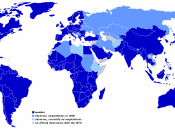There is the multitude, and there are natural leaders. Wealth, birth and culture mark out the man to whom a community looks to undertake its government. These men have the leisure and the fortune...They are the aristocracy, and the rulers of a country should be taken from among them." --Lord Salisbury * * * When Lord Salisbury uttered this tribute to the ruling class in Britain, in the mid-1890s, he was Prime Minister in a government almost entirely composed of MPs who enjoyed inherited wealth, land or titles. (They were all men, of course, and all opposed to women's suffrage.) Historian Barbara Tuchman, in The Proud Tower, graphically describes the rigid class structure that prevailed in the British Isles at the time--and which remains more or less intact today.
"The ruling families," she writes, "had no doubts of their inborn right to govern and, on the whole, neither did the rest of the country."
Eventually, the British aristocrats were forced to moderate their more blatantly elitist ways. They had to extend the right to vote to women and to men without property. They had to allow ordinary people from "the multitude" to run for office and even sit in the House of Commons. But they never considered such commoners to be "gentlemen" like themselves. They maintained most of their power and privilege, even though they did not display it quite so openly. And the squalor and misery to which they consigned the "lower classes" continued to blight the lives of millions who had the misfortune to be born outside the ruling families.
Ruling classes, of course, are not confined to Britain. They have emerged in almost all countries, in all ages. Often they comprise the nobility, sometimes the land-owners, sometimes the military, occasionally the priesthood--but always the holders of the greatest wealth. In the past, such rulers, whether kings or high priests, warlords or dictators, governed with an iron fist. And often their harsh rule provoked violent revolutions that sent them to the gallows or the guillotine.
The ruling classes learned from these sobering lessons that they had to share at least some of their wealth and give the masses some degree of freedom. And so democracy in its various forms replaced absolute rule by the rich and powerful.
But, make no mistake, the aristocracy continued to flourish in most countries, and ruthlessly held and extended their economic sway. Today it is almost entirely a corporate aristocracy of wealth. The world's 400 or so billionaires don't have titles; there is no King Gates or Grand Duke Buffett; but the power they wield over the world's peoples (and governments) is virtually absolute.
Such power cannot be exercised without inflicting harm on the powerless, on their communities, and on the environment. Poverty, income disparities, homelessness, sickness, illiteracy, slave labour, air and water pollution--these and other grave social and economic malignities multiply as the corporations exploit and plunder the planet's limited resources.
As in the past, people are starting to rebel against their oppressive rulers. They are protesting at corporate summit meetings; they are campaigning against industrial pollution, deforestation and strip-mining; they are boycotting companies whose sweatshop products are made by overworked and underpaid children.
It's an uphill struggle, but there's more at stake today than there was in any previous revolution--perhaps even the survival of life on Earth. The British aristocrats, for all their pride and arrogance, had natural limits imposed on their greed. So did the Bourbons and the Czars and the Mongol hordes. Their depredations were confined by geography. They couldn't conquer and pillage the entire world.
But the transnational corporations can. That, in fact, is precisely what they're doing. Freed from legislative restraints on their power, answerable only to their major shareholders, equipped with the financial and technological weapons of global conquest, armed with the sweeping rights conferred on them by international trade agreements, their armies of executives, bankers, lawyers, and administrators overrun country after country. Servile politicians do their bidding. Media toadies praise their iniquities and ridicule their critics.
Some notion of how extensive corporate power has become can be gleaned from the hearings currently being conducted by the Canadian Democracy and Corporate Accountability Commission (CDCA). Headed by former NDP leader Ed Broadbent, this commission was set up to make recommendations to the federal and provincial governments on how corporations can be made more socially accountable for their actions--how they can be forced to be "good corporate citizens." In a series of questions posed in a discussion paper prepared by the CDCA's staff, we are asked if corporations should have to reveal their compliance with labour, human rights, environmental, consumer, health and safety, and tax laws. Should their directors be compelled to consider the interests of non-shareholders? Should they be prevented from contributing to political parties? Should corporations that engage in anti-social or criminal activities be dissolved or have their charters revoked? When I made a presentation to the commission on behalf of the CCPA, I answered all these questions with a fervent "yes." And I filed a copy of Tony Clarke's Silent Coup and a dozen or so articles from The Monitor that contained cogent supporting facts and arguments.
I held out little hope, however, that any proposals by the CDCA to curb the power of corporations would be seriously considered by the politicians, let alone implemented. "There is no government in Canada," I said, "that would dare antagonize its business masters." The commission perhaps anticipated the ultimate political rejection of its recommendations in a set of questions in its discussion paper: "Can such changes [to make corporations more responsible to the public interest] be made without jeopardizing Canadian competitiveness? Can they be made unilaterally or must they be made on a global basis, perhaps through the World Trade Organization?" I assured the commissioners that, if their report calls for meaningful curbs on the abuse of corporate power, they will indeed be told by the politicians that Canada would be placed at a competitive disadvantage if such changes were adopted. And, as for the WTO, well, any substantive changes in corporate conduct and priorities on a global scale would take many, many years to achieve. (In short, forget it.) I hastened to add that this didn't mean I thought their project was necessarily a futile exercise. Although their findings and proposals, if genuinely circumscriptive, will be dismissed by governments and scoffed at by the corporate media, I predicted they would be welcomed and widely endorsed by the civil society organizations that are most active in challenging corporate rule. Such a report by the commission, I said, would deepen the activists' understanding and strengthen their resolve.
This might well turn out to be an overly optimistic assumption on my part. Why? Because some of the CDCA commissioners are corporate executives. (Which is like a commission set up to investigate organized crime inviting Mafia dons to preside over its hearings.) And, to compound this grotesquerie, all the major business groups, like the BCNI and Conference Board of Canada, have also been invited to tell the commission how their socially harmful activities can be better monitored and controlled. Is this high farce, or what? I could be misjudging this extensive corporate involvement in an inquiry into corporate wrongdoing. With CLC President Ken Georgetti also participating, perhaps the commission's report will still be one the NGOs can embrace. But if it's a report reached by consensus among the commissioners, it could be a pretty insipid one, suggesting only a few mild cosmetic reforms.
It may be significant that, when I finished my presentation, one of the business commissioners said I could be jumping to an unwarranted conclusion when I assumed the NGOs would find the recommendations worthy of their support. He said it was by no means a safe assumption that the questions posed in the discussion paper about making corporations more accountable would receive the same "yes" answers from the commission that I had given.
In retrospect, his admonition could be well founded. The CDCA's report may even turn out to be more acceptable to business than it is to the civil society groups. That would be very disappointing, but perhaps not surprising. All efforts up to now to tackle corporate power through the legislative route have failed, and it would be naive to think the CDCA initiative will have any different outcome.
The NGOs could still benefit from it, however. There are still some among them who think lobbying the politicians can serve a useful purpose. When they see the ineffectiveness of the CDCA project, when they see that the corporations are no more accountable after the commission makes its recommendations than they were before, they may also come to see the grim reality of corporate rule. They may decide from now on to devote their resources to fighting the corporations directly in all the extra-parliamentary ways that they can devise.
The corporations are tremendously powerful, but they're not invulnerable. As their unconstrained pursuit of profit becomes more visibly disruptive, as they hurt more individuals and communities, as they befoul more of the ecosphere we all share, more and more people will join the revolt against them. And eventually--let's hope before it's too late--the business bulwarks that now seem so impregnable will be shattered.
There was a time when people thought the Berlin Wall would never come down. When it fell, the hammers weren't swung by the politicians (and certainly not by the corporations), but by average citizens who saw it as an abomination they would no longer tolerate.





